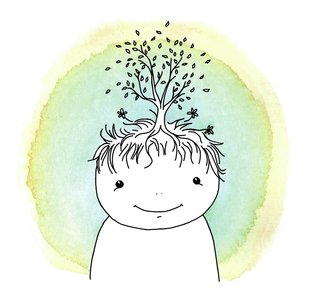Book Excerpt from:
Bully Proof
Practical Strategies
For Parents, Educators and Coaches
We Give Words Power
Screening out negative self-talk is like pulling weeds in the garden of your mind.
 Grow what you want.
Grow what you want.
"Our children’s ability to deal effectively with bullies is significantly impacted by the inner dialog that they create inside their minds. Self-talk reflects children’s mental well-being and the strength of their self-esteem. If their self-esteem is strong, the messages from the bully will seem silly and will not impact them or trigger their inner worries about themselves. With the children at our school we often give the following example.
If you were approached by a toddler who called you a fool, you would probably laugh and not take the insult seriously. Nor would you wish the toddler harm, as they clearly do not know any better. However, we take it personally and get upset when the insult comes from someone we think should be respectful or know better. In return, we may judge them and wish them ill. This is our mind questioning, doubting, judging, and sometimes sentencing without compassion or forgiveness. We were confident with the toddler and our mind saw the insult as a harmless lie or opinion from someone who has no control over us. Why should an insult from an older person be any different? Could we alter our self-talk to counsel ourselves that all insults are harmless and that the insulter may be in pain and in need of our kindness rather than our hate? When we pay attention to the quality and content of our thoughts, we can transform our self-talk, so that it brings awareness, peace, and happiness rather than doubt and judgement. As parents, educators, and coaches, we can have an enormous impact on the inner strength and self-esteem of our children by directing them to be mindful of their inner dialog and to respect the power of words.
Our communication towards our children, whether verbal or nonverbal, has a powerful impact on their self-esteem. This is particularly true for our younger children, who have not yet developed critical filters that allow them protection from the negative messages from others. Children under twelve years of age are typically more in the alpha brainwave state than adults. This state of mind is essential for learning quickly; however, it is also very vulnerable to suggestions.. . ."
If you were approached by a toddler who called you a fool, you would probably laugh and not take the insult seriously. Nor would you wish the toddler harm, as they clearly do not know any better. However, we take it personally and get upset when the insult comes from someone we think should be respectful or know better. In return, we may judge them and wish them ill. This is our mind questioning, doubting, judging, and sometimes sentencing without compassion or forgiveness. We were confident with the toddler and our mind saw the insult as a harmless lie or opinion from someone who has no control over us. Why should an insult from an older person be any different? Could we alter our self-talk to counsel ourselves that all insults are harmless and that the insulter may be in pain and in need of our kindness rather than our hate? When we pay attention to the quality and content of our thoughts, we can transform our self-talk, so that it brings awareness, peace, and happiness rather than doubt and judgement. As parents, educators, and coaches, we can have an enormous impact on the inner strength and self-esteem of our children by directing them to be mindful of their inner dialog and to respect the power of words.
Our communication towards our children, whether verbal or nonverbal, has a powerful impact on their self-esteem. This is particularly true for our younger children, who have not yet developed critical filters that allow them protection from the negative messages from others. Children under twelve years of age are typically more in the alpha brainwave state than adults. This state of mind is essential for learning quickly; however, it is also very vulnerable to suggestions.. . ."

